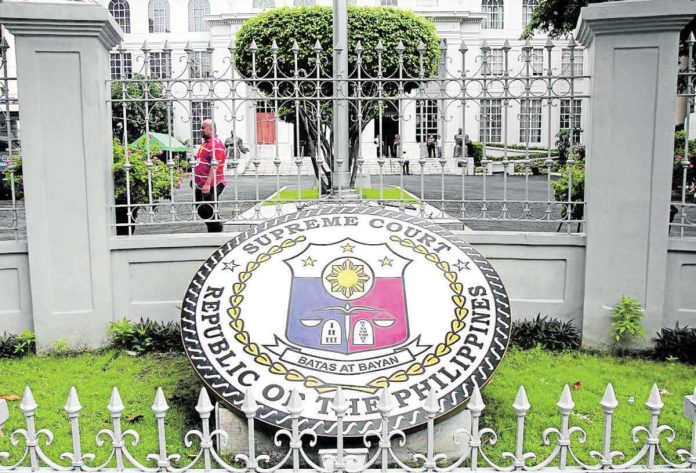
BY GEROME DALIPE IV
ILOILO City – The Supreme Court has clarified that mere violations of procurement law by public officers does not automatically constitute a violation under Republic Act No. 3019 (RA), or the Anti-Graft and Corrupt Practices Act.
According to the recent ruling, the tribunal held that a breach of procurement procedures by itself does not automatically violate RA 3019, specifically Section 3(e), which penalizes public officers who cause undue injury to government or private parties through their wrongful acts.
In this case, the Court acquitted the petitioners — Arnold D. Navales, Rey C. Chavez, Rosindo J. Almonte, Alfonso E. Laid, and William V. Guillen — because the prosecution failed to prove beyond a reasonable doubt that the petitioners’ actions were done with corrupt intent or that they caused undue harm to public interest as required by Section 3(e).
The Court emphasized that mere deficiencies in the procurement process are not enough to establish the elements of graft under the law.
The high court pointed out that there must be clear evidence of fraudulent intent and actual harm or damage caused to the government or the public.
The decision underscores the principle that, in criminal cases involving public officers, the burden of proof lies with the prosecution, and all the necessary elements of the crime must be established to secure a conviction.
In this case, the petitioners were officials of the Davao City Water District (DCWD), with some serving as members of the Pre-Bidding and Awards Committee-B (PBAC-B).
The controversy centered around the DCWD Board of Directors’ approval of General Manager Wilfredo A. Carbonquillo’s recommendation to engage in direct negotiations with Hydrock Wells, Inc. for the drilling phase of DCWD’s water supply project.
Under the procurement laws, particularly the Government Procurement Reform Act (Republic Act No. 9184), public projects typically undergo a competitive bidding process. However, in certain cases, direct negotiation is allowed, but only under specific circumstances as outlined by the law.
In this situation, the DCWD opted to negotiate directly with Hydrock, bypassing the regular bidding process.
Hence, the complainant accused the petitioners of violating procurement laws and potentially engaging in graft for their involvement in this process.
The key issue in the case was whether the actions of the petitioners in approving or participating in the direct negotiation with Hydrock constituted corruption or abuse of their public office.
The SC’s ruling provides a significant clarification on how violations of procurement laws are to be treated under the Anti-Graft and Corrupt Practices Act.
In this case, PBAC-B’s decision to waive the standard advertisement requirement and invite only a select group of accredited well drillers for a negotiated contract effectively bypassed the competitive public bidding process required by Presidential Decree No. 1594.
This decree mandates competitive bidding as a safeguard to ensure transparency, competition, and fairness in government infrastructure projects.
In addressing the administrative and criminal complaints, the Supreme Court ruled that the petitioners could not be held liable for grave misconduct in the absence of proof of bad faith. Grave misconduct requires a clear showing of intent to violate rules or act dishonestly.
Since there was no evidence that the petitioners acted with malice or bad faith in bypassing certain procurement procedures, the Court held them accountable only for simple neglect of duty or simple misconduct.
The Sandiganbayan had initially convicted the petitioners of graft under Republic Act No. 3019 (the Anti-Graft and Corrupt Practices Act), arguing that their actions violated the law’s mandate for transparency and fair competition in procurement.
However, upon appeal, the Supreme Court acquitted the petitioners, stating that failure to follow procurement laws alone is not sufficient to prove graft. For a conviction under Section 3(e) he officers must have intended to provide an unwarranted advantage to a party or caused undue injury to another.
The Court noted that there should be a concrete disadvantage to the government or a gain to a private party that resulted directly from the officers’ actions.
In this case, while the procurement process was not strictly followed, there was no evidence of corrupt intent or undue harm.
Therefore, the Court concluded that procedural lapses, without proof of malice, do not meet the threshold for criminal liability under the Anti-Graft law.
Under Section 3(e) of Republic Act No. 3019 (the Anti-Graft and Corrupt Practices Act), for a procurement violation to qualify as graft, it must involve bad faith, manifest partiality, or gross inexcusable negligence.
Essentially, the tribunal held that a simple procedural lapse in procurement is not enough to constitute a violation under Section 3(e). There must be clear evidence of intent, bias, or gross neglect that results in actual harm or unjust benefit.
The tribunal held the petitioners, as members of the PBAC-B, were responsible only for recommending the contract award to the DCWD Board.
The Board held the authority to approve and finalize the contract award, meaning the ultimate decision did not rest solely with the petitioners.
While the procurement process might have had irregularities, particularly in bypassing public bidding procedures, the Court did not find evidence that these violations were done with bad faith or manifest partiality.
The petitioners believed that the negotiated contract route was allowed due to the urgency of the procurement and the lack of sufficient qualified bidders.
The tribunal concluded that the petitioners’ actions, though potentially violating procurement procedures, were not done with manifest partiality, bad faith, or gross negligence necessary to constitute graft under RA 3019.
The lack of corrupt intent and the reasonable belief in the legality of their actions played a key role in their acquittal. Therefore, despite procurement irregularities, the Court found no criminal liability under the Anti-Graft Act./PN





